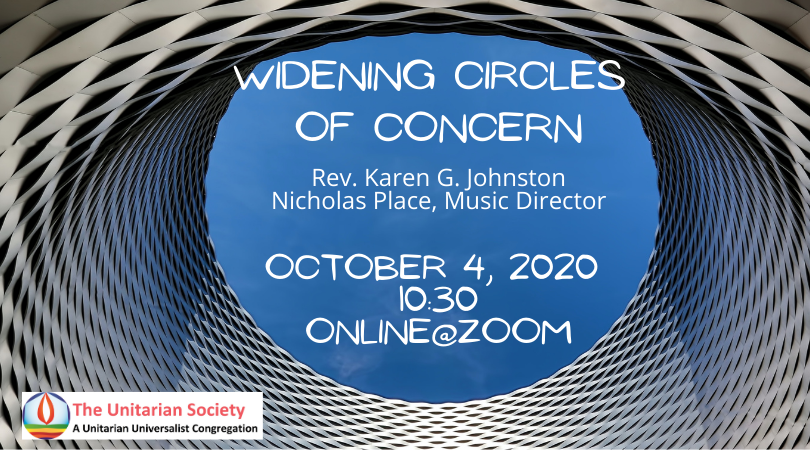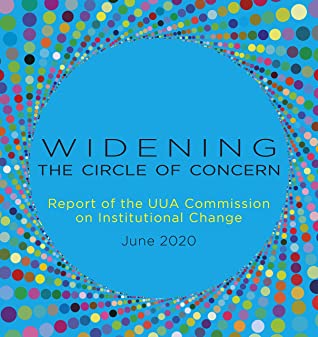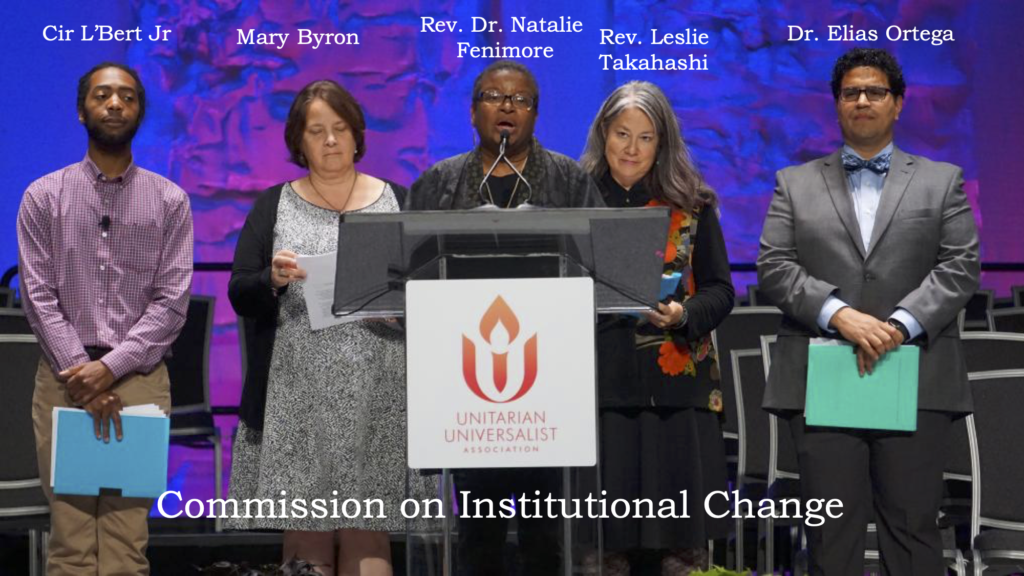
Reverend Karen G. Johnston
October 4, 2020
The Unitarian Society, East Brunswick, New Jersey
What is at stake is nothing less than our future.
So says Widening the Circle of Concern, the highly anticipated report from the UUA’s Commission on Institutional Change. Published this past June, it was a central focus of this year’s General Assembly.

Throughout this current year, many different groups within Unitarian Universalism have committed to making this report the focus of their learning and leadership development. For instance, the Metro New York chapter of religious educators (our own Jessica M. Hess sits on their exec team), developed and held just this Thursday a Professional Day for professional religious educators, ministers, and musicians focusing on the report’s findings.
This past summer, a hard copy of the report was sent to EVERY congregational president with an invitation that boards spend time with the recommendations. I am unaware of any similar determined effort to get the word out to congregations: an indicator of how important the report is.
Side note: my guess is that if any congregation wants to be considered by minister of color or one who centers anti-racism work, they are likely going to be asked how the congregation engaged in this report. Choices now impact future options.
So, to large degree, today’s sermon is “insider baseball” for Unitarian Universalists. It’s important that we know not only of its existence, but become familiar with its recommendations. Backstory that brought the Commission on Institutional Change ~ and their report ~ into being will help make sense.
There was the “Spring of our Awakening” – as some call 2017, when a courageous voice among our Unitarian Universalist leaders of color spoke out about an unfair hiring process within the Unitarian Universalist Association. Out of this whistle-blowing came accusations, later founded, of hiring patterns that reinforced white supremacy culture, hiring white individuals to leadership positions and people of color to positions with less influence and capacity to shape the course of our association. Threats also came – aimed at the whistleblower and her family, from within the congregation she served and wider Unitarian Universalism. Yes, from within our own faith movement.
Also that spring: surprisingly, and painfully, and in my opinion, non-covenantly, the president of the UUA, himself a Latino man, resigned with just a few months left in his term, which sparked other resignations within the leadership of Unitarian Universalism.
What seemed like our Association falling apart, became an opportunity to tend to the roots of the problem, to consider new ways of doing leadership and shared ministry, and to re-examine what we, as a faith movement, stand for.
Would this become yet another time in our history when we make bold promises about building the multicultural world we dream of, only to break those promises? We have done this repeatedly. Or would this be different?
We don’t know yet. Part of how we will know is if we – yes, this congregation, and others like us, for all of us make up the Unitarian Universalist Association of Congregations – decide to engage this report, or just let it lay gathering dust on a shelf.
What is at stake is nothing less than our future.

The Commission on Institutional Change was made up of six UU leaders from across our faith movement – representing different roles, positions, and cultural identities in Unitarian Universalism. The people who made up the Commission were chosen with great intention. They spent three years of deep listening, learning and researching, soliciting stories and input, analyzing data, and then, producing what turn out to be 30 recommendations with 90 identified actions in ten categories of our communal life as Unitarian Universalists.
All of the categories are more or less relevant to every Unitarian Universalist. A few are more directly relevant to us, particularly the category, “Congregations and Communities.”
This report is not for the faint of heart. But we are not a faint-hearted people, are we? We can’t be, not if the report tells us that what is at stake is nothing less than our future.
~~~
The report recognizes that more and more folks opt out of organized religion and as such, the reasons that people opt into religion, are willing to check out a UU congregation, have changed over the past decades, have changed since some of you longer-here beloveds, found your way here. The report notes that
“As institutional religion declines, more who enter our doors are not the refugees from other faiths, but are experiencing faith communities for the first time through our faith and are seeking spiritual ground.”
and that
“We have spent [too] time comparing our religious wounds rather than healing them…our time as a haven or social club for those disaffected by other religions has passed. In these searing times of political division, climate change, economic polarization and global strife, people need a sustaining faith.”
“We continue to attract a greater diversity of people and to retain a very small percentage of those who do not match the resourced, white, aging, majority within our congregation.”
The report attributes one of the reasons our congregations are in trouble is “our inability to address issues of inclusion, equity, and diversity.” Adding to this is the toxic prioritization of individualism – of focusing on the First Principle without understanding it in the context of covenantal community.
The report goes beyond naming the problem, including sharing firsthand testimony, to making recommendations and naming action steps. Of the 90 action steps, in the chapter on congregations and communities there are thirteen. While there isn’t time to list them all here, I do want to share with you the “take-aways” at the end of this chapter in particular:
- Congregations that choose to engage to increase equity, inclusion, and diversity are leading the way into the future.
- Too often congregations must do this challenging work by themselves when learning communities would be easy to form.
- Curated resources, learning circles, and funding to develop needed tools should be a priority for UUA-led efforts under the leadership of the Liberal Religious Educators Association.
- Anti-oppression tools as well as conflict facilitation are essential to leadership development efforts, and leadership development is needed in the complex and often conflictual context of leadership today.
- None of this can be accomplished without better communication between the Unitarian Universalist Association and the congregations it serves.
- Regional gatherings could touch more Unitarian Universalists and help provide a common frame of reference.
- Regional staff should provide a consistent structure for work on diversity, equity and inclusion.
What is at stake is nothing less than our future.
I wonder if we ~ The Unitarian Society ~ will take up the invitation to do this work? We have people in this congregation willing to spend their time growing their anti-racism skills. We have people who express the desire for a more multi-cultural congregation.
Can we do the deep work that goes beyond wanting a diversity of skin hues in the pews just to make ourselves feel better? Are we willing to do the work of opening to the deep transformation that genuine equity, inclusion, and diversity necessitates?
I welcome the chance to share this ministry with you.
It can feel daunting ~ it is daunting ~ particularly given everything else going on in the world. With that in mind, I want you to hear this voice, these words, of hope and possibility. They come Rev. Sofia Betancourt. She spoke them a year after the Spring of Our Awakening, the year many congregations, including this one, took part in an association-wide Dismantling White Supremacy culture teach-in, a year in which it seemed possible that chaos might win.
Reverend Betancourt teaches at Starr King, one of our two UU seminaries. She was, for the brief period when we had no president of the UUA during that Spring of our Awakening, one of the three co-presidents who set our Association on a new course. Here she is, her own self:
With the strength of generations. This is what we are.
As the hymn sings: our grandmother’s prayers. Our grandfather’s dreamings.
Living into and becoming “the weary, ragged miracle that is our living tradition.”
~~~
With our Soul Matters theme this month of Deep Listening, I invite us listen deeply to this report, even if it makes us feel all sorts of ways, like some of the animals in today’s story – like shouting out of anger, like trying to focus on fixing, like getting stuck on remembering the past, like wanting to blow up the hard work of others. I wonder if we can move through all the feelings of resistance, of defensiveness, of intellectualization, and get through to the part where we can altogether take a step back and behold a vision of our faith movement building into something that will be amazing.
Reverend Betancourt was rightly quoted liberally in Widening the Circle of Concern, for she is one of our wisest contemporary theologians. She said these words which I invite you to take in to soothe our troubled, challenged hearts as we listen deeply to this daring and demanding report:
“The good news is that we are in control of what we do with our daily living. If we, each one of us, represent a missing remnant in the fabric of our collective future – then together we can lean into a possibility that we have yet to fully experience in human history. A collective wholeness. An unassailable good. That is the very kind of salvation I am here to fight for in the small moments of every single day.”
I call on all of us to remember who we are: our grandmother’s prayers, our grandfather’s dreamings, just as the hymn reminds us.
I call on all of us to remember who we are, just as the poet Joy Harjo urges us:
To remember that all is in motion, is growing, is you. And this includes our beloved Unitarian Universalism.
Amen. Blessed be.